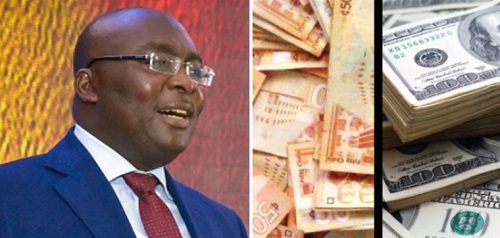
Depreciation of the cedi has been lower under NPP - Bawumia
The New Patriotic Party's flagbearer, Dr Mahamudu Bawumia, has asserted that the current strength of the cedi against the dollar demonstrates an improvement compared to its value during the National Democratic Congress government's tenure.
In an interview with AfricaWatch Magazine, Dr Bawumia highlighted the cedi's resilience under the President Akufo-Addo administration, emphasizing his position on stabilizing the cedi's value.
He remarked that despite ongoing global economic challenges, the depreciation of the cedi has been managed effectively, especially when contrasted with the previous NDC administration.
“Why not? We use averages to measure progress in statistics and economics all the time. It is a valid comparison of the management of the exchange rate under our government versus under the NDC government. The point is that notwithstanding the major global and domestic challenges we have been through, it is remarkable that whereas the exchange-rate depreciation between 2009-2016 averaged 13.9%, between 2017-2023 it averaged 13.1%. That is a fact,” Dr Bawumia stated.
“The data shows that from 2009-2016, the cedi depreciated cumulatively by 71.1%, and between 2017 and 2023, the cumulative depreciation was 64.6%. So, whether you look at the average or the cumulative, the depreciation of the cedi has been lower under our government, notwithstanding the severe global shocks we have endured. That is the basic truth.”
Dr. Bawumia also defended a remark he made during the NPP's 2016 campaign, reaffirming his view that an exchange rate reflects a government's strength when its fundamentals are robust.
He attributed the current exchange rate's fluctuations to global crises such as the Russia-Ukraine conflict and the 2019 COVID pandemic.
“Absolutely! It is still true, and I will continue to stand by that statement. We saw that between 2017 and 2021 when the fundamentals in terms of the fiscal deficit, inflation, GDP growth, external balances, and international reserves were fairly strong, the exchange rate was relatively stable," he said.
“But following the COVID-19 pandemic, the Russia-Ukraine war, the banking-sector crisis, the excess-capacity energy payments, and the lack of access to international capital markets, the fundamentals of the economy were weakened, and the fiscal deficit and debt levels increased.
“Inflation reached some 53% at the end of 2022 and you saw the exchange rate depreciate by some 30% in 2022. The fundamentals have strengthened recently, with the declining fiscal deficit, declining inflation, improved external reserves, and so on, and this has resulted in relative stability of the exchange rate. So, my statement still holds true.”